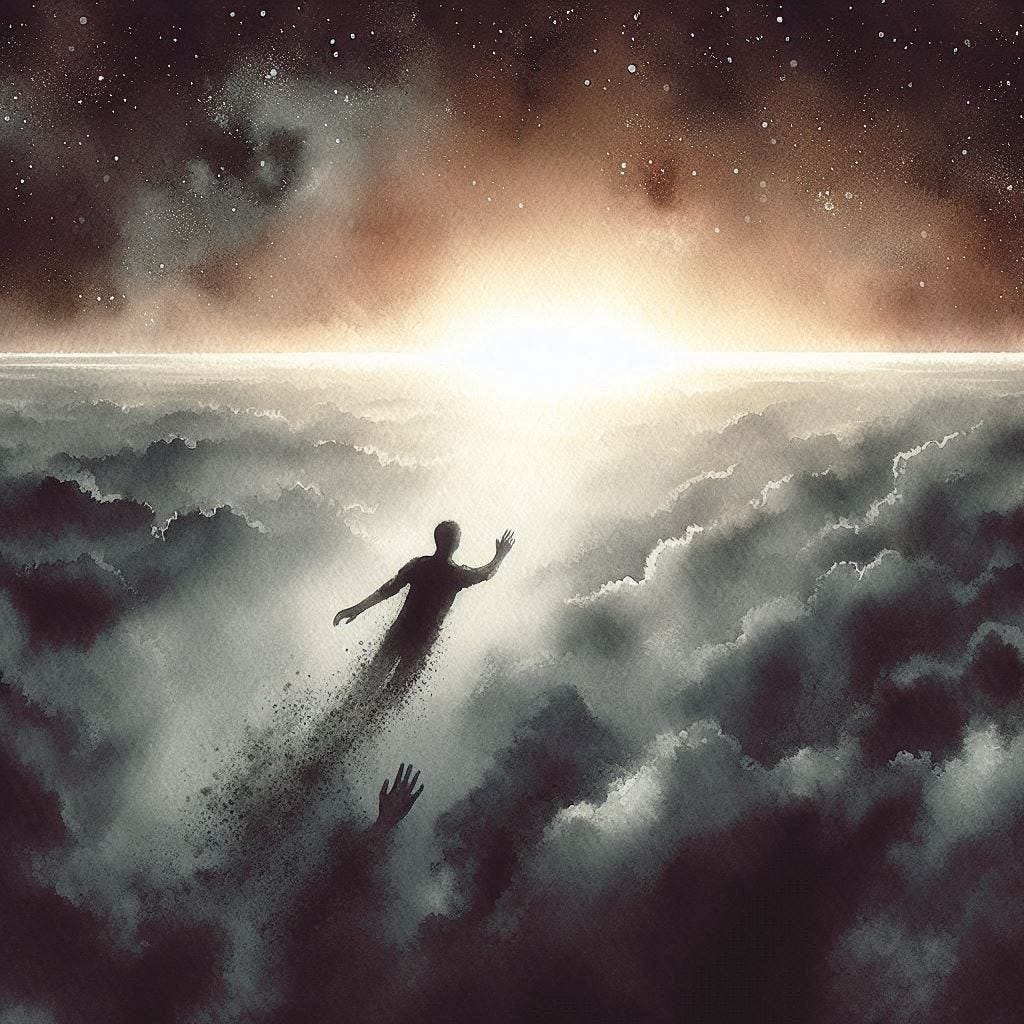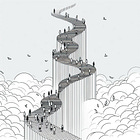The Guilt of Letting Go
On guilt, silence, and what it means to lose faith
To the Deep Thinkers,
Welcome to the Deep Thinkers Newsletter: A collection of essays dedicated to going beyond the surface.
If you’re new here, check out the Deep Thinkers archive.
If you asked me how I’m doing, I’d lie to you.
I’d say I’m good, that everything is fine. But things are not fine, and I’m far from “good.”
Deny your true feelings long enough, and your mind, body, and soul start to revolt. Each time you swallow the truth of how hurt, anxious, scared, or guilty you feel, the shadow of self-betrayal grows darker.
I feel its eyes on me every day, watching and waiting—daring me to acknowledge it. Finally, I have.
The truth is: I have lost faith in the God I was raised to believe in.
I carry a lot of guilt for this. But I can’t force myself to believe anymore, and I’m tired of pretending I do.
The Weight of Guilt
“Our faith is faith in some one else’s faith, and in the greatest matters this is most the case. Our belief in truth itself, for instance, that there is a truth, and that our minds and it are made for each other,--what is it but a passionate affirmation of desire, in which our social system backs us up?”
—William James
We are all vulnerable to our truths, and our reality is usually filtered through contingencies—that is, through circumstances we never chose, at least not at first.
My mom converted to Christianity when I was very young. Church, multiple times a week, became mandatory. Evangelical values, worldviews, and rituals became law. As a kid, those values framed my reality, and they stayed with me long after I stopped going to church.
That’s why the guilt feels so heavy.
I didn’t get a say in the worldview imposed on me as a child, so why feel guilty now for letting it go and reaching toward something I can build for myself? Even when I try to reason with it, the guilt clings to me. It sits in the pit of my stomach and wraps its fingers around my throat, refusing to let me rest.
I wish more people could see how easily their beliefs would change if just one detail in their lives had played out differently. How can anyone be so certain their beliefs hold the entire Truth?
It’s that certainty—and the air of superiority it often carries—that drives me insane. A belief system alone doesn’t make you a good person. It doesn’t make you right. Especially an inherited one. Inherited faith is like inherited wealth: you can possess it without effort, flaunt it without merit, and mistake it for virtue. But even knowing that, the guilt doesn’t let me go.
All I Hear Is Silence
When faith collapses, what do you do with the void that’s left behind?
For me, faith was held together by fear, mostly the fear of hell. That was it. That was the glue holding it all together. In my house, embracing secular ideas and perspectives was dangerous and proof of weak faith. Open-mindedness felt sacrilegious, and nuance never held a place.
But I’ve always been curious, and though I didn’t speak my doubts out loud very often, they pinballed inside me with nowhere to go.
In a way, I was always going to end up here—floating in uncertainty and guilt. But I don’t want to stay here. Nihilism doesn’t feel like home. I can sense a frontier beyond disbelief, but still don’t know how to cross it.
I once believed the church held the key to Truth. Now I see how those “truths” distorted everything—from how I saw myself to how I saw other people. It’s a tension that feels like begging for answers and getting only silence in return. Silence is all I hear—it’s maddening. I’m less sure than I’ve ever been, and it’s terrifying. But the world is much more than I was raised to imagine, and the teachings from my childhood no longer bring the comfort they once did.
And yet, even fear doesn’t rewrite a life in an instant. Radical shifts in worldview typically take years. Mine has grown slowly, nurtured by curiosity and a growing need for self-discovery.
Why do I believe what I believe?
Am I just trying to convince myself, or am I simply afraid?
The more I asked, the more I learned about myself. I want nuance instead of dogma. Understanding instead of blanket judgments. I want values that can stand up to scrutiny, and beliefs that ring true all the way down to the crypt of my spirit—not ideologies rooted in fear.
Religion felt like the opposite of everything I wanted.
But…the guilt. The unrelenting, unforgiving guilt. Letting go of inherited beliefs feels right, yet also like a betrayal, not just of ideas, but of the people and institutions that once gave my life meaning. There was a foundation there, once, however shaky it was. Now, I float in the ether.
The Stages of Building a Worldview
Is the void proof I made the wrong choice, or is it the price of building a worldview of my own? Does it get easier, or am I destined to carry this guilt for the rest of my life?
What’s on the other side? Getting there isn’t a single leap but a series of stages—each one moving aside and laying a new foundation for the next. Seeing the steps is one thing. Climbing them is another.
Stage 1: Inherited Certainty
I used to be terrified that my thoughts alone would damn me to hell. I had so many doubts, but I buried them because I thought the doubts made me a bad Christian. Questions felt like rebellion, and defiance was rebuked.
Over time, though, I started to notice the cracks within this system of certainty. I stopped going to church. I met people with completely different faiths, each one just as certain as the Christians I grew up with. They, too, thought they had the ticket to paradise.
Certainty itself was the deception. I grew disillusioned, shifting from angsty and naive to spiteful and dismissive, becoming the kind of person who grew angry at the mere mention of divinity.
Stage 2: The Void
By my twenties, the sliver of faith I had eroded. My prayers felt wasted, tossed into silence. I was told God knew my needs, so why did I have to beg? That contradiction infuriated me.
Good things happened. Bad things happened. It didn’t seem to matter if I prayed or not. Divine justice was nowhere to be found, and “turning the other cheek” just left an opening to get hit again.
In the midst of this jaded haze, the guilt whispered. And I shouted back: Why? Why should anyone feel guilty for rejecting what they never freely chose?
Again, all I heard was silence, and so I felt despair.
I was indoctrinated young. I never stood a chance.
And when those beliefs finally stopped speaking to me—when they no longer gave me strength—I was still expected to feel guilty? As if I owed eternal loyalty to an accident.
Stage 3: Reconstruction
Now, in my thirties, nuance has begun to replace much of my rage. I’d be lying if I said I wasn’t still angry, but I can zoom out now and see things from more angles.
It began with curiosity. I fell back in love with reading, learning, and writing, releasing the emotions that once festered in my silence. I found philosophies that spoke to me.
Nihilism gave way to hopeful skepticism. And through it, I realized that true meaning can’t be handed down. It has to be created. I see that all this guilt is a side effect of questioning and building a worldview of my own.
I don’t need delusional certainty. I want something different. Something I can build myself. And it’s on me to build it.
Not Certain, Still Trying
I have a bit more clarity, but I don’t have peace of mind yet. Faith still feels so fragile. The teachings from my childhood still echo like an old operating system, and guilt lingers as proof that the old operating system was strong.
I’ve learned more about myself and the world than I ever could have while chained to dogma. But contingency cuts both ways. If my inherited beliefs were contingent, so are the ones I hold now. I outgrew the old framework, and may outgrow this one. Maybe I’ll circle back to religion one day—with nuance, with choice. Or maybe I’ll wander forever.
Some will never wander. Their inherited beliefs still sustain them, or their worldview feels so solid and sure that what I describe here is foreign to them. I would never tell someone to abandon their faith. But I wish more people saw how fragile certainty truly is—how a different birthplace, family, or encounter could have built an entirely different worldview.
Instead, we shout our truths at one another until it all becomes noise, and what’s lost amidst this noise is the recognition that our paths—physical, mental, spiritual—are shaped by circumstance as much as conviction.
It takes empathy to recognize this. I didn’t choose my birthplace, parents, or traditions. I inherited them. Rejecting them isn’t betrayal, it’s freedom. It’s the opportunity to become the author of my own life, instead of marching to commands I never understood.
I want a belief system I can be proud of, because I helped build it. I want to see how others built theirs. And I want to accept guilt for what it is: a leftover from a time already passed.
Enjoying the essays? Consider becoming a paid subscriber to support more thoughtful, in-depth work like this.
Or leave a one-time tip—every little bit helps
Your support, whether monetary or simply sharing this essay, means the world to me.
✍🏾 In Case You Missed It:
Much love,
—Jon ♾️






Deep wisdom for these polarized times:
But I wish more people saw how fragile certainty truly is—how a different birthplace, family, or encounter could have built an entirely different worldview.
Commenting as someone else who is in the deep process of assessing and reconfiguring my own worldviews, your reflections hit the contemplation bullseye.